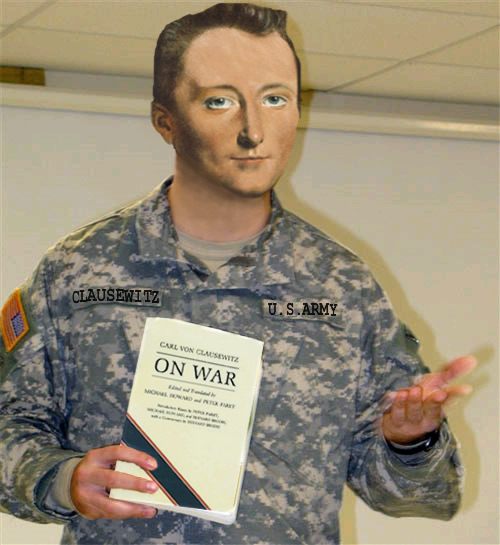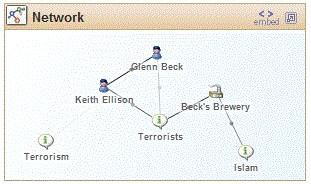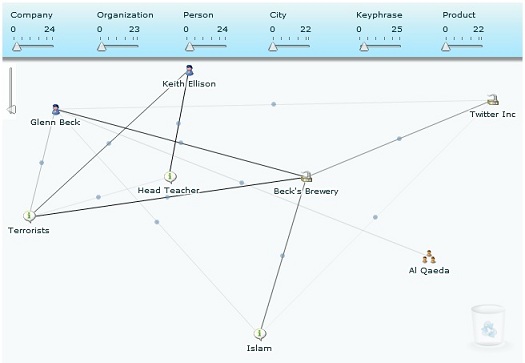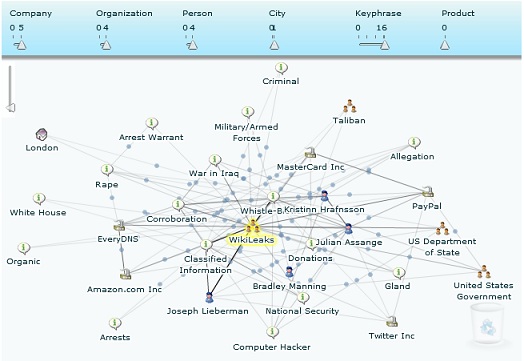If America Had the Same Political Organization of Classical Greece
Tuesday, June 14th, 2011America of City States ( Hat tip Shlok)

Would like to see this mashed up with 2008 and 2010 election result maps
America of City States ( Hat tip Shlok)

Would like to see this mashed up with 2008 and 2010 election result maps
[ by Charles Cameron ]
It’s riveting to follow the tweets on protests in Bahrain, Egypt, Libya or Iran on Mibazaar in real-time to be sure — but mash that capability up with the one Shloky found and Zen just mentioned with video…
As Zen says, I mean, “automatic face-recognition and social media aggregation raises serious concerns about the potential dangers of living under a panopticon state”.
Two dots, two data-points, two apps connected.
[ by Charles Cameron ]
I for one am delighted to know that we can now play around with the iridology of the sciences, using the software available on the Science-Metrix Ontology Explorer site to view which fields have journals which cross-link to journals in other fields…
Seriously — that lower image is of the Field Citation Wheel that you can find, suitably enlarged for easy viewing, on that site.
*
And it’s heartening for me to know, for instance — taking a closer look at the segment of that image that’s roughly east north-east — that scientific journals do have some links on their pages to works of theology or philosophy:
Engineering, you’ll notice, has more links than history, philosophy, theology, the social sciences (even counting them twice), economics, business, the arts and humanities combined.
My own field, theology, has to share its thin segment with philosophy, and you can guess how small the number of links to articles on Islamic apocalyptic probably are…
Which is, in part, why I wonder whether a project like the ETH’s Living Earth Simulator will really manage to map such things as, well, a possible outbreak of global jihadist Mahdism and its consequences.
*
But then I look at another gorgeous graphic from the same source, focusing in on a part of the network of knowledge that interests me, and I can just faintly make out, lower left, entirely isolated, the field of music…
What splendid isolation! That’s all of Bach, mind you – and all the Beatles, too.
*
Seriously, though:
- It’s fascinating to be able to see how the various branches of knowledge cross-reference each other.
- Visual data representation is a gorgeous, fantastic, field.
- Mapping the all-of-everything is an irresistable lure for keen minds
- I’m betting the humanities will prove to be at least as good at it as the sciences.
- And I recall, not without a pang of regret, the time when my beloved Theology was Queen of the Sciences, and one might converse with Abelard on the streets of Paris…


This article at SWJ blog has stirred a lively debate in the comments section with some very able practitioner-scholars weighing in.
….Sun Tzu?s ancient military philosophy of indirectness and gradualism runs counter-culture with much of mainstream western military strategy. Western reliance on superior technology and firepower shaped American counterinsurgency doctrine to be largely lethal in nature and enemy focused. Clausewitz instructed generations of military officers that the destruction of the enemy?s army is the primary goal in all combat1; therefore, all political-military conflict results in offensive action where attrition of the enemy force becomes a universal requirement. Clausewitzian war theory „worked? in both world wars in that the Allies did accomplish their desired goals; however critics such as Israeli strategist Shimon Naveh raise valid questions on whether Clausewitz?s fixation on offensive action and attrition warfare helped or hindered the Allied causes2. Despite Clausewitzian strategy?s seemingly illogical structure, application of his theories in the major 20th century conflicts created an enduring military school of war strategy with „On War? taking a sacred position.
In fairness to Clausewitz, this is over the top.
The US military could use more Sun Tzu; it is far more Clausewitzian in the perspective of the officer corps than it is “Sun Tzuite”, but the armed services are not the Children of Clausewitz. Not even the US Army. We’d probably be better off if the American military was more thoroughly one or the other in terms of strategic culture than the industrial age, bureaucratic, ad hoc, legacy thinking non-strategic hodgepode that currently prevails.
I do not expect that to change. American military organizational culture is driven more by appropriations than by ideas.
Some Related Links:
Sonishi.com Interview with Martin van Creveld on Sun Tzu
Sonishi.com Interview with Chet Richards on Sun Tzu and Boyd
Christopher Bassford on Sun Tzu, Jomini and Clausewitz
[ by Charles Cameron ]
We’ve been having an intriguing discussion recently in the comments here on Zenpundit about mapping / modeling complex situations in a way that leaves us humans more liable to come to nuanced understandings and less liable to unintended consequences, and one point that keeps on cropping up is the need to pare down the number of nodes in our mapping without losing sight of the subtleties…
I was thus delighted to find, as I was doing my morning trawl of usual and unusual news sources, that Glenn Beck had come out with his estimate of how many Muslim terrorists there are in the world (10% of the global Muslim population, ie 157 million), Fareed Zakaria had refuted him — and there was even a helpful Silobreaker network diagram to show me how the relevant nodes under discussion fit together:

I was delighted to see that (Mormon) Glenn Beck is more closely associated with (Muslim) Rep. Keith Ellison than he is with terrorists, and sorry to note that Beck’s Brewery and Islam are somehow linked… But naturally, once I had seen this much I wanted to drill down even deeper — so I entered the appropriate keywords at Silobreaker and found this:

You’ll see that Beck’s link with Al Qaeda is, thankfully, a weak one. And I think you’ll agree with me that even shifting from a six node to an eight node graph considerably ups the sophistication of analysis required to fully comprehend the issues portrayed.
*
In any case, I thought it might be appropriate to post Silobuster’s more detailed map of the current situation with WikiLeaks here:

All becomes clear, eh?
I particularly like the node labeled “Gland” (it’s almost hidden but not quite, you’ll find it lower right, between PayPal and Twitter)– that might be the one I’d zero in on to get a fuller appreciation of the complexities of the situation.
And for the record, this post is an example of British “humor” — or as we prefer to call it, “dry wit”.